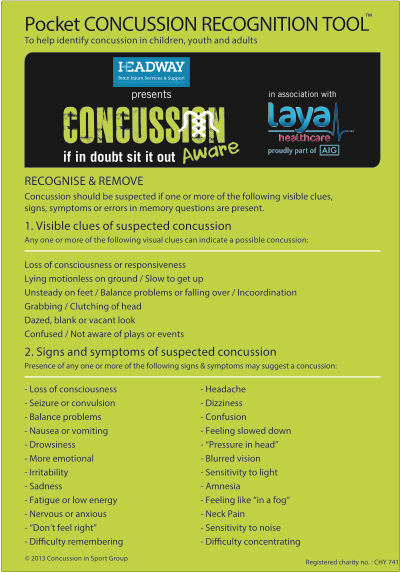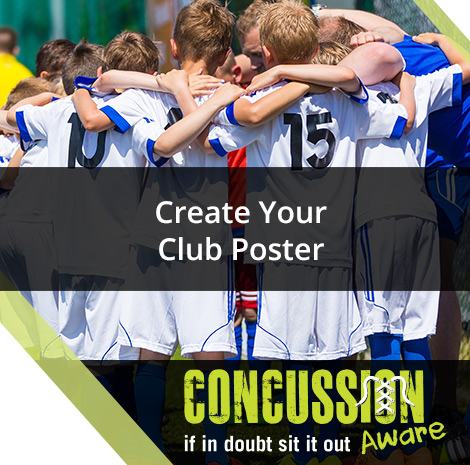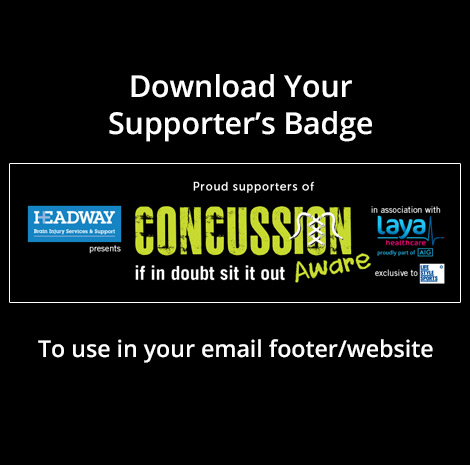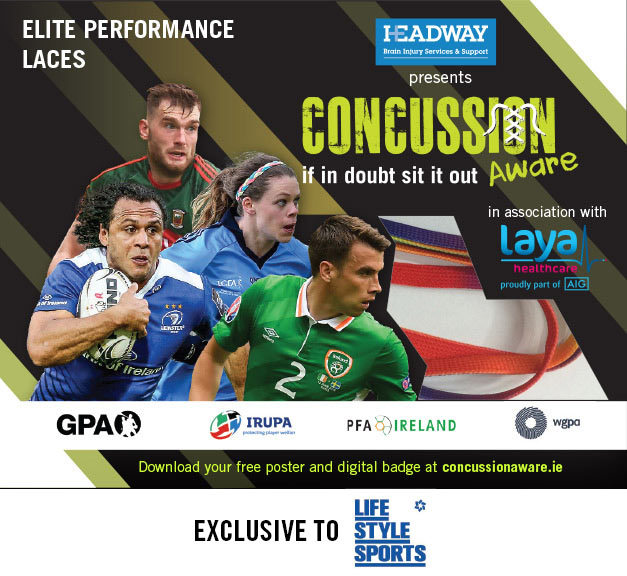What is Concussion?
Concussion is a type of traumatic brain injury caused by a knock or jolt to the head. Concussions can also occur from a blow to the body that causes the head and brain to move rapidly back and forth—literally causing the brain to bounce around or twist within the skull.
You don’t have to pass out (lose consciousness) to have a concussion. Some people will have obvious symptoms of a concussion, such as passing out or forgetting what happened right before the injury. But other people won’t. With rest, most people fully recover from a concussion. Some people recover within a few hours. Other people take a few weeks to recover.
It’s important to know that after a concussion the brain is more sensitive to damage. So while you are recovering, be sure to avoid activities that might injure you again.
In rare cases, concussions cause more serious problems. Repeated concussions or a severe concussion may lead to long lasting problems with movement, learning, or speaking. Because of the small chance of serious problems, it is important to contact a doctor if you or someone you know has symptoms of a concussion.
With early diagnosis and proper care, symptoms resolve quickly in most cases. If it’s not treated it may have long-term consequences – sometimes for years A damaged blood vessel may bleed into the brain. This is uncommon, but can be serious, as a build-up of clotting blood can cause pressure on the brain. Symptoms of damage or bleeding may not develop for some hours or even days, after a knock to the head. In rare cases, symptoms from a slow bleed can develop even weeks after a head injury.
This is why ‘head injury instructions’ are given to people who have had a head injury. These provide information, including symptoms to look out for following a knock to the head.
Download our pocket concussion guide here.
Why Should I Be Concerned About Concussion?
Most players with a concussion will recover quickly and fully. But for some signs and symptoms of concussion can last for days, weeks, or longer.
So why is it so important for you to sit it out? If a player/you have a concussion, your brain needs time to heal. A repeat concussion that occurs before the brain recovers from the first—usually within a short time period (hours, days, weeks)—can slow recovery or increase the chances for long-term problems. In rare cases, repeat concussions can result in brain swelling or permanent brain damage. They can even be fatal.
If you do the right things to get better, concussion doesn’t have to be a big deal. If you don’t, you could be missing all of the things you like for a very long time.
How Can I Recognise a Concussion?
Download our pocket concussion guide here.
| Signs to look for as a coach/referee/parent | Symptoms reported by player |
|---|---|
| Appears dazed or stunned (such as glassy eyes) | Headache or “pressure” in head |
| Is confused about assignment or position | Double or blurry vision |
| Forgets an instruction or play | Nausea or vomiting |
| Is unsure of score or opponent | Balance problems or dizziness |
| Moves clumsily or poor balance | Sensitivity to light or noise |
| Answers questions slowly | Concentration or memory problems |
| Loses consciousness (even briefly) | Feeling sluggish, hazy, foggy, or groggy |
| Shows mood, behavior, or personality changes | Confusion |
| Can’t recall events prior to hit or fall | Does not “feel right” or is “feeling down” |
| Can’t recall events after hit or fall |
Signs and symptoms of concussion generally show up soon after the injury. But the full effect of the injury may not be noticeable at first. For example, in the first few minutes the player might be slightly confused or appear a little bit dazed, but an hour later they can’t recall coming to the practice or game. So assess, then assess again, then re-assess even later. Make sure that the player is supervised for at least one or two hours after you suspect a concussion. Any worsening of concussion signs or symptoms bring them to the GP or local hospital.
What is Second-impact Syndrome?
An athlete who is recovering from a concussion, but who has not yet fully recovered, is at risk of second impact syndrome (SIS).
Second-impact syndrome (SIS) occurs when the brain swells rapidly, and catastrophically, after a person suffers a second concussion before symptoms from an earlier one have subsided. It can occur minutes, days or weeks after an initial concussion, and even the mildest grade of concussion can lead to SIS.
Most cases of SIS have occurred in young people, who are thought to be particularly vulnerable. It is imperative that players do not return to play before symptoms of an initial head injury have resolved. The result can be fatal. However, although devastating in every case, it is also important to say that the risk of catastrophic outcome after sport-related concussion is very low.
What Should I do if I Suspect a Concussion?
Coach
- If in doubt sit them out. – No matter whether the player is a key member of the team or the game is about to end, a player with a suspected concussion should be immediately removed from play. You will most likely not have access to medical expertise so you will not be in a position to diagnose the situation.
- Ensure that the player is evaluated by a GP. Again do not try to judge the severity of the injury yourself. Healthcare professionals have a number of methods that they can use to assess the severity of concussions. Recording the following information can help GP’s in assessing the player after the injury: Cause of the injury and force of the hit or blow to the head or body. Any loss of consciousness (passed out/knocked out) and if so, for how long. Any memory loss immediately following the injury. Any seizures immediately following the injury. Number of previous concussions (if any).
- Keep the player out of play the day of the injury and until the GP says they are symptom-free and it’s OK to return to play. After you remove a player with a suspected concussion from practice or play, the decision about when to return to practice or play is a medical decision.
Parents
If your child has sustained a head injury/concussion It is important that you do the following:
- Familiarise yourself with the symptoms of concussion (download your pocket tool here)
- Have your child evaluated by a GP. Do not try to judge the severity of the injury yourself. Their brains are still developing. If it’s not diagnosed and managed right they could take a lot longer to get better, have a brain injury that never heals, be out of sports for a very long time, or – though rare – if they get another concussion before they’ve healed, the results could be fatal.
- Monitor your child’s symptoms at home and report any new or worsening symptoms to your GP as well as school/club if relevant
- Don’t let your child back out on the day of the injury. Wait until the GP says they are symptom-free and it’s OK to return to play.
- Help protect your child’s brain. If he or she has been concussed, they will need complete cognitive rest to heal from a concussion. That means limiting television, computer screens, video games, text messaging, reading, loud music/noises and homework while recovering. Your GP will advise you on the appropriate approach.
Players
- Familiarise yourself with the symptoms of concussion (download your pocket tool here)
- If you experience any of the symptoms report this to a coach, referee, parent, friend or team mate
- Listen to what they say. Often your judgement will be impaired so you may not be in a position to take the right decision
- Don’t return to play until your GP says you can return.








